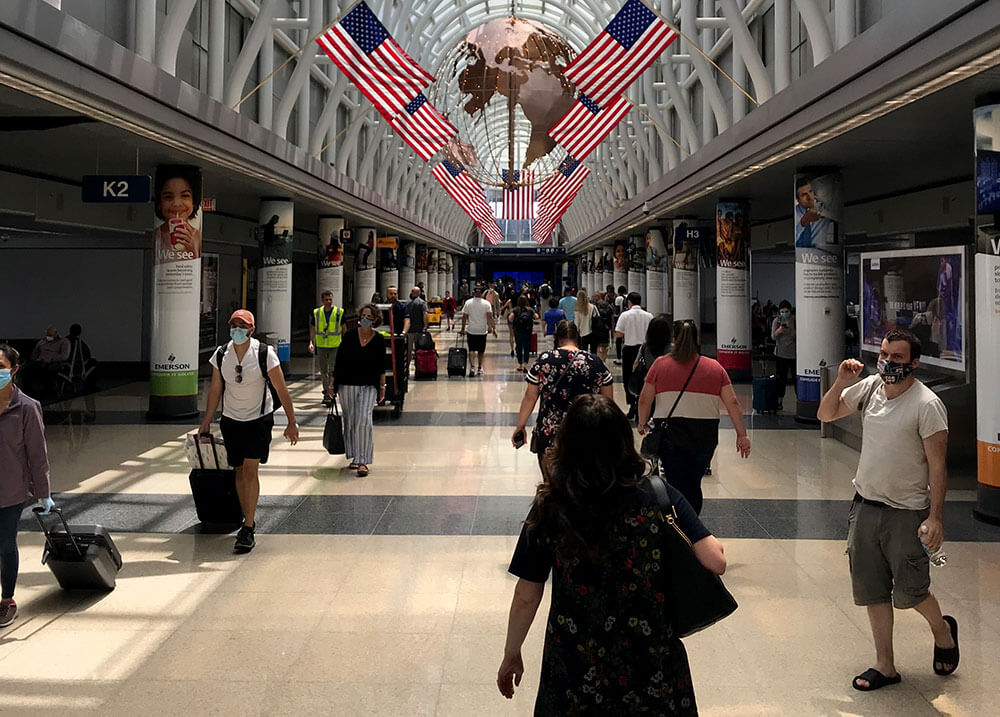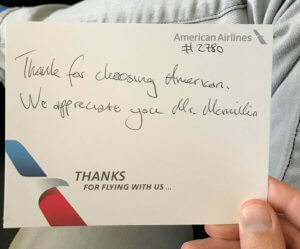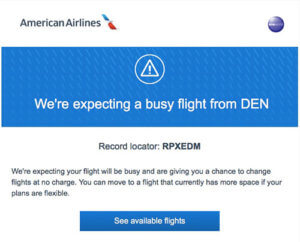
The scene at O’Hare Airport during associate editor David McMillin’s recent flight to Denver.
Last week, I did something I haven’t done in nearly four months: I got on a flight. I had read about McKay Coppins’ “surreal” flying experience — “I Just Flew. It Was Worse Than I Thought It Would Be.” — in The Atlantic, and as an anxious flyer pre-COVID, I was even more nervous now. In addition to being on high alert for turbulence, I worried that some fellow passenger’s cough would land me in the ER in a week’s time. The trip was essential for family reasons, though, so I had to push through.
When my wife and I arrived at Chicago’s O’Hare for our departure, the scene felt… oddly normal. It wasn’t as crowded as a typical day at one of the nation’s busiest airports, but it was far from empty — seeming to back up research that suggests people are ready to travel again. With so many passengers milling around, social distancing was an impossibility. Lines of passengers snaked awkwardly through the concourse as people attempted to buy drinks at the lone open bar and pick up food from the limited number of open venues. If we felt this claustrophobic at the airport, what was the plane going to feel like? As it turned out, my experience in the sky provided me with some insights that can be applied to events.
Customer Appreciation Has Never Been More Essential.
The airline industry is one of the hardest-hit businesses in the economic fallout from COVID-19, but our flight on American Airlines to Denver was one of the most positive experiences I have had on a flight.

American Airlines presents passengers with personalized notes after flights.
“Now, more than ever, we want to thank you for being our customer,” the pilot said in a welcome greeting to passengers. “We know this is a hard time to travel, and we appreciate your business.”
It was clear that the entire flight crew recognized how important each passenger on the plane was to their own well-being and the company’s ability to make it through the pandemic. In fact, one of the flight attendants handed out personalized hand-written notes before we landed.
When events and conferences can safely return, organizers should take a cue from this authentic expression of gratitude. Traveling anywhere and being in crowds is going to feel uncomfortable. Those who are willing to spend money to wear face masks while enduring a no-frills experience (there was no beverage service on the flight, and I doubt there will be soon) are more than customers, passengers, guests, or attendees. They are the ones who could mean the difference between failure and success for a business. As organizers look ahead to hosting their first face-to-face gatherings, it’s important to think about how to show a deep level of care and appreciation for the individuals who will brave the “new normal” to be there.
Let Everyone Know What to Expect.
The flight to Denver was the picture of social distancing, with nearly all the middle seats empty. Flight attendants offered to help passengers relocate if they wanted more space away from others. Our return flight to Chicago, however, was a different story. In fact, it felt more packed than most pre-COVID flights I remember, but I was prepared for it. Five days before the trip, American had sent me an alert, warning me that they expected a busy flight and offering me the option to change my plans at no charge.

An American Airlines alert
Event organizers will need to accommodate varying levels of concern among attendees. Some may be fine with close quarters, and others will not accept anything less than six feet of separation. This will impact how organizers plan for capacity thresholds in breakout sessions. For example, if one session on the program looks especially popular based on sign-ups in a mobile app, give attendees a heads-up: If you’re leery of crowds, you might not like this experience.
That warning might just work in the organizer’s favor, too. When I received American’s alert, I paid to upgrade to first class to avoid a middle-seat stranger instead of switching flights for free. Perhaps the alternative option for attendees can include something extra such as an intimate VIP session. Then, it’s a win-win: Attendees get additional space and value and organizers get additional revenue.
My airline experience inspired me to take a trip down Nostalgia Lane to a simpler time. Each of the members of our editorial team wrote about how they dealt with the airport before COVID-19.
David McMillin is an associate editor at Convene.
